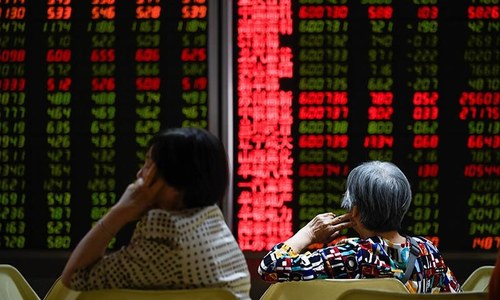KARACHI: Confusion and uncertainty are rising in the market as the Chinese New Year ends while the government there has extended the closure of business till Feb 12 according to some announcements.
Every year the Chinese New Year celebrations bring supply chains to a halt as factories in China shut down and workers head home for the holidays. This year, however, the outbreak of the 2019 Novel Coronavirus during these holidays has disrupted movements, with the Chinese authorities extending the shutdown to Feb 12 in most provinces.
Talking to Dawn, some traders and businessmen in Pakistan said that loading of goods in China has come to a halt while others believe that everything is going normal.
Most industries that rely on raw materials imported from China usually build stocks to last them through the holiday closure, but in some cases at least those stocks are now running low and businesses are left wondering when normal imports might resume.
On top of this, the government has issued numerous directives to port health officials about how cargo and crew arriving from China are to be handled, and in some cases these directives have fueled the confusion. In a directive issued on January 28, the government required all cargoes of perishable products as those cargoes that have extensive contact with humans, such as used clothing, coming from China to be fumigated.
Supply chain disruption feared if New Year closures persist
“Importers have been asking us what is going on,” said one customs clearing agent when reached out by Dawn. “The requirements have held up cargoes, and the government has been changing conditions one after another.”
On Monday, the Directorate of Central Health Establishments issued another ‘clarification’, telling importers that there is “no additional requirement for fumigation in cargo ships”, which was understood by customs clearing agents to mean that the requirement has been withdrawn altogether.
But restrictions on the movement of ship personnel remained in place. The Port Health Establishment has required that operators of all incoming vessels will need to give an undertaking of “not having any diseased person having signs and symptoms” of coronavirus on board. Additionally, personnel on these vessels will not be allowed on shore without clearance from Port Health official, and all personnel on deck areas will need to wear masks and gloves.
In addition, Customs have been required to check preloading health certificates for cargo, baggage, livestock, raw material, used clothes, utensils as well as raw meat and fish as of Feb 1.
General Secretary All City Tajir Itehad, M. Ahmed Shamsi said claimed that loading of finished goods like electrical items, confectionaries, toys, etc in containers had been suspended in China. He said it was unclear whether this was due to the coronavirus outbreak directly, or to an extension in the New Year celebrations announced recently.
Chairman Korangi Association of Trade and Industry (KATI), Sheikh Umer Rehan said all shipments arriving from China are being cleared at the port while more shipments are also on their way that were booked prior to China’s new year holiday.
Rehan said that so far there has been no serious issue of raw material as industries have enough stocks. However, raw material availability may become more serious in case China further extends holidays and industries in China further delay reopening their operational activities.
President Site Association of Trade and Industry (SAI), Muhammad Suleman Chawla said shipments from China, which were booked prior to Chinese New Year holiday (from January 26 to Feb 3), were being cleared at the port here.
Some shipments are being fumigated while others are being released without fumigation, he said claiming that he had not received any complain from their members regarding problems in loading of goods from China and clearance of goods at the Karachi port.
Shamsi said only those shipments were arriving which were booked before Chinese holidays and some goods are being fumigated after reaching here at the port.
Published in Dawn, February 4th, 2020















































